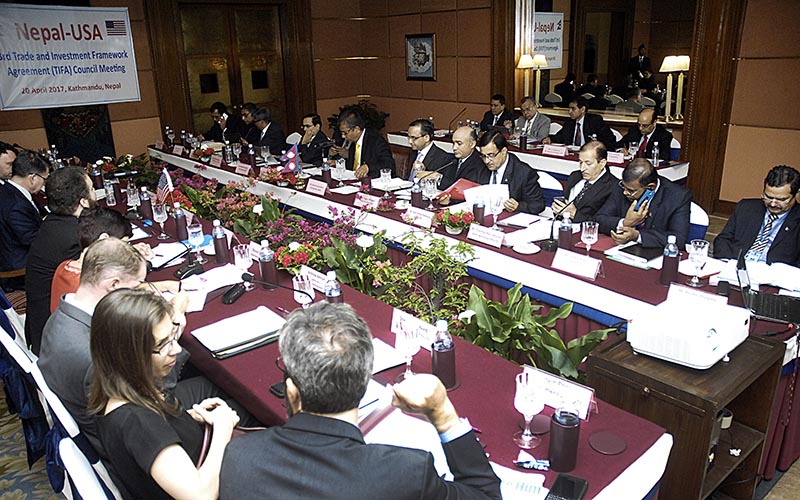Nepal to better utilise duty-free facility of the US
Kathmandu, April 20
The third round of Nepal-USA Trade and Investment Framework Agreement (TIFA) council meeting concluded here today with an agreement to expand bilateral trade and bring in investment from the world’s largest economy.
The meeting, led by Commerce Secretary Naindra Prasad Upadhyay from the Nepal government, and Mark Linscott, assistant trade representative from the United States Trade Representative Office, discussed on a wide range of areas, including better utilisation of the duty-free quota-free (DFQF) facility for 66 Nepali items in the US market, reform in intellectual property rights policy to bring investment and easing visa process for skilled Nepali labour to the US under mode IV of General Agreement on Trade in Services (GATS).
The United States, through the Trade Preference Act, has extended DFQF market access to 66 Nepali products that include luggage, handbags, pocket goods, travel bags, carpet, shawls, blankets and headgears, among others, on top of the regular facility of generalised system of preference (GSP).
According to Upadhyay, the US government has been extending DFQF for 82.6 per cent products of the US tariff lines. However, the utilisation of GSP is at a very dismal 11.5 per cent of the total import of the United States from Nepal. He said that DFQF facility on 66 items provided by the US government exclusively for Nepal will provide ample opportunities to expand exports to the world’s largest economy. Total export of these products to the US in 2016 hovered around $8 million. These products are handicraft in nature and traditional and can be produced by micro and small enterprises in rural areas as well. They thus have high potential to contribute in poverty reduction as envisaged in the Trade Preference Act of the United States.
Currently, the country has been exporting carpets, textiles and felt products, women’s apparel, handicraft products, animal feed and total exports to the US stood at $89 million in 2016.
Citing the domestic supply constraints and infrastructure bottlenecks, Commerce Secretary Upadhyay also sought American investment in Nepal to unleash country’s potential.
“Investment from the US in hydro electricity and high value natural resources based products will materialise the potential of these sectors for sustainable growth and robust long-term economic recovery following devastating earthquakes of 2015 and trade disruptions,” Upadhyay said. “The government is ready to welcome investment from the US in the form of venture capital and technology transfer.”
Nepali delegation also informed about the legal and institutional reforms made following the promulgation of the constitution to create an investment friendly environment in the country. During the meeting, the US delegation hailed the efforts of the government to create a conducive environment for bringing in foreign investment.
In the meeting, US Ambassador to Nepal, Alaina B Teplitz, said that regular meeting of TIFA council every year in each other’s country will enhance two-way connectivity and expand economic relations. Citing an example of Ghana, which exports products worth $1.2 billion to the US every year, Teplitz further said that Nepal needs to explore all the potential to reap benefit from the US market and attract investment.
“More US companies based in India are willing to expand their operations in Nepal, however, Nepal must ensure protection of investment and guarantee to repatriate returns to lure them to the country,” the ambassador said, adding, “FDI is very important for Nepal for sustainable growth.”
The US delegation showed concern on the weak intellectual property laws in Nepal citing this is one of the major binding concerns for US companies to expand their business in Nepal.
The US delegation comprised of representatives from Department of Agriculture, Department of Commerce and United States Patent and Trademark Office. Likewise, Nepali delegation comprised of officials from the Ministry of Finance, Ministry of Labour and Employment, Department of Food Technology and Quality Control, Department of Customs, Nepal Bureau of Standards and Metrology, Department of Industry, Investment Board Nepal and Nepal Rastra Bank, among others.
The meeting has also decided to mobilise the US government’s technical assistance under the Trade Preference Act to conduct a study on economising the cost of production of Nepali export products to the US market, capacity building of government officials, legal reforms and minimising sanitary and phytosanitary barriers faced by Nepali export products.
The Nepali delegation also requested the US delegation to include readymade garment products under the zero tariff facility as all the major readymade garment products are excluded from the Trade Preference Act.
READ ALSO:
TIFA's third meeting begins from today






